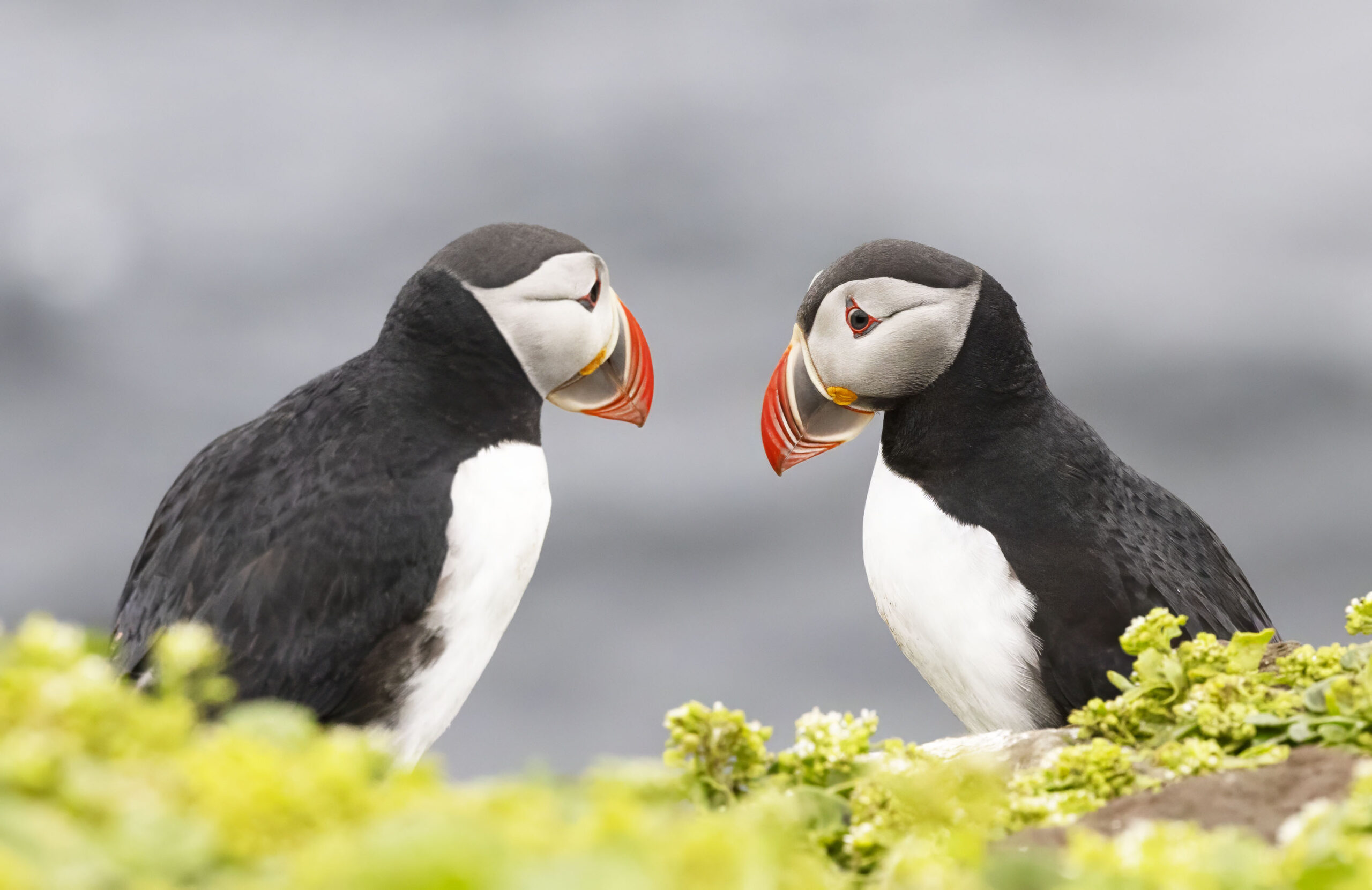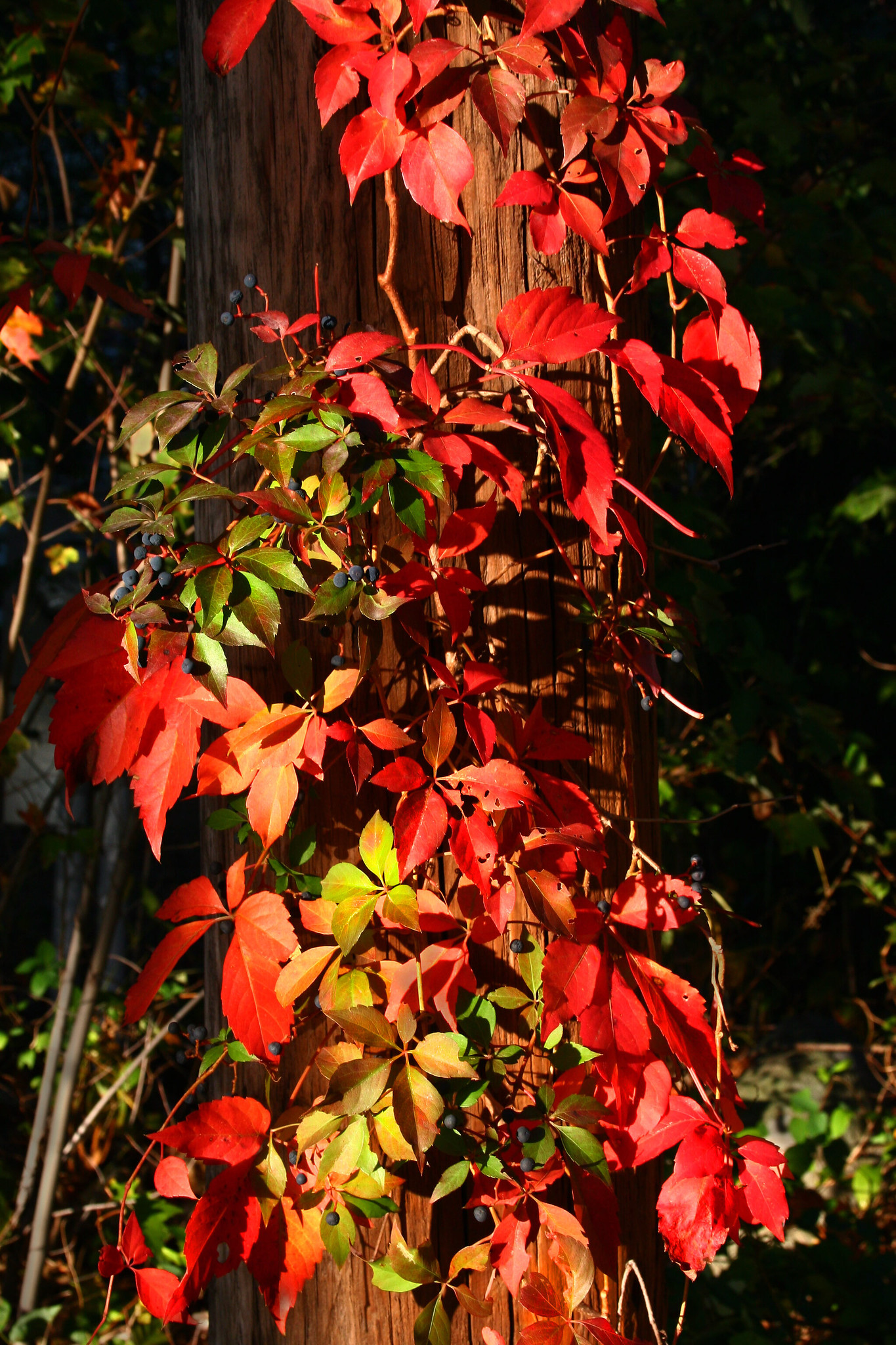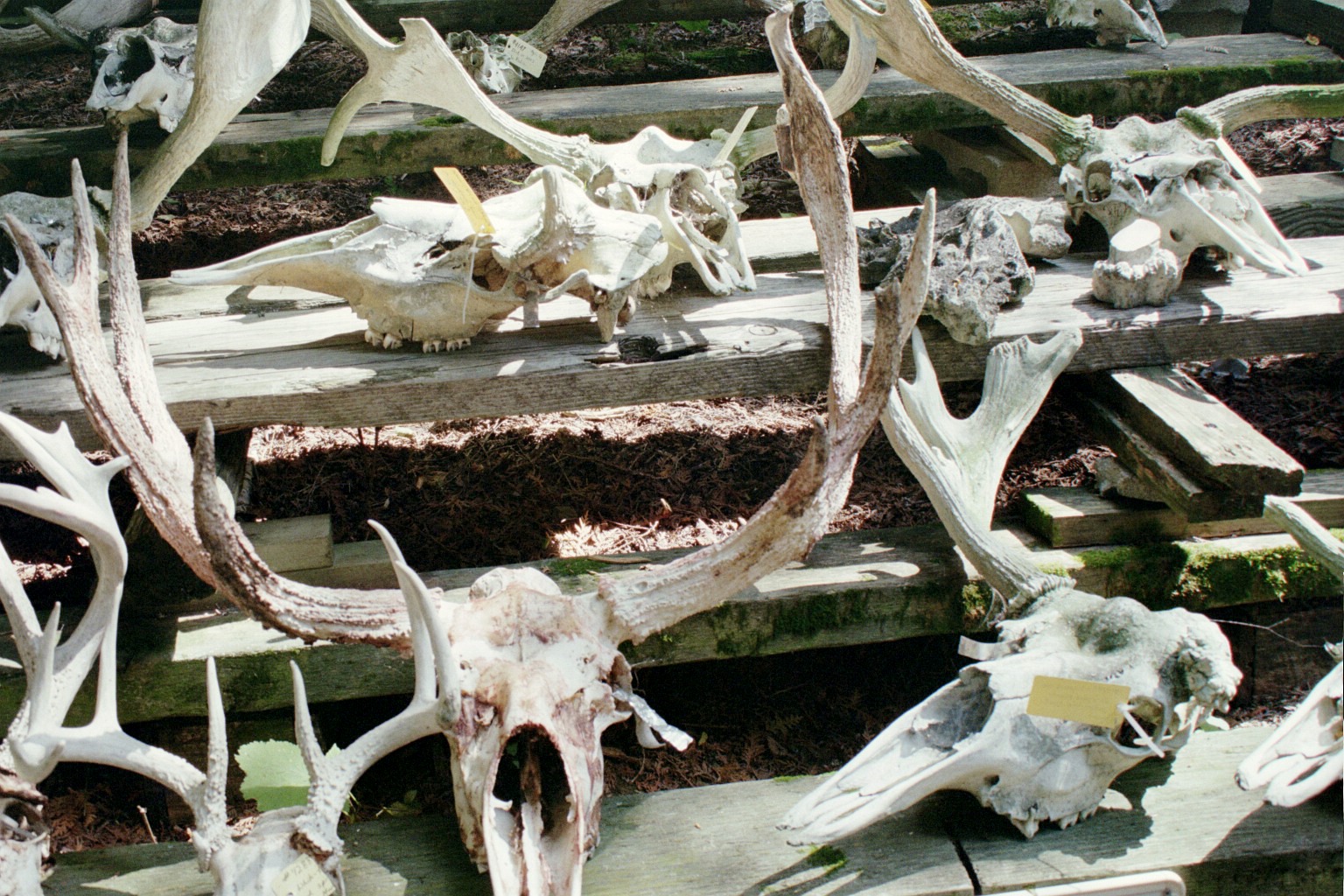 Isle Royale National Park
Isle Royale National Park
The powerboat clips Scofield point and breaks away from my cabin toward the more serious waters of Lake Superior. My guide, Tom, cranes his neck to view the shore as if he’s never seen it before, though he knows these bends and inlets well. We pass the outer islands—Rabbit, Caribou, Cemetery—which lift like teeth from the blue-green water. The motor quiets as we turn inward and thread the eye of Moskey Basin, toward docks and wooden nets, remnants of a long-gone fishing industry cast along the shoreline.
I’m the island’s poet-in-residence, deemed fit by the National Parks Department to capture, in verse, this landscape’s essence. I’ve been here two weeks now, with two more to go, but with none of the distractions of the modern world, time stretches out like the open waters in front of me. I’ve come to the island to do what poets do, I suppose, which is to interrogate the process of living, to situate the human animal’s experience in relation to the wilder world.
But I’m also here in an act of separation, an act of personal searching, which, I suppose, is also the poet’s task. For weeks before I left I stared at some lines tacked above my desk, the first stanza of Yusef Komunyakaa’s great poem “Islands”:
An island is one great eye gazing
out, a beckoning lighthouse,
searchlight, a wishbone compass, or
counterweight to the stars.
Komunyakaa’s is a poem of exile and return, but what type of compass will this island be for me? What will fall under the searchlight I have cast in marooning myself here on one of the last truly wild places in the country?
Isle Royale is part of Michigan but is situated so far in the northwest corner of Lake Superior, it is nearer the wilds of southern Canada. The island is one of the least visited national parks in the country, and one of the smallest, reachable only by boat or seaplane. But the remoteness of this island does not make it immune to the devastations of human impact. For centuries, animals moved back and forth from the island each winter on an ice bridge that formed in Lake Superior. With rising temperatures and rising water levels, this movement has ceased; the only animals moving back and forth now are humans and birds and the occasional strong swimming moose. Scientists call this an isolated ecosystem, an ideal place to study the way animals interact when stranded together.
The history of human movements on the island has been recorded in logs and early photographs, but also in oral histories by the Ojibwa and early Canadian and European visitors, stories passed on generation to generation. Some of these stories are noble and rooted in the island’s beauty. Some, as you would imagine, are rooted in violence and conquest. Like many other remote places, Isle Royale has long existed as a space people travel to find something, something they are missing in their lives or themselves, something they couldn’t find anywhere else. At the turn of the twentieth century the island was home to commercial fisheries and a robust mining industry, even as boats dropped off wealthy tourists from Duluth and Chicago in search of better air and an encounter with the unknown northern wilderness. The island became a national park in 1940, and ever since, people have travelled hours over the rough waters of Lake Superior to see what they could find.
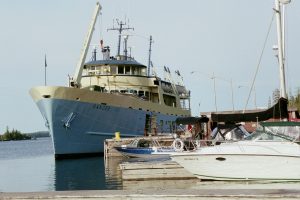
Tom talks about this as we approach the fishery, but he looks at ease behind the wheel. Tom has been summering here his entire life. His family bought one the small inner islands in the 1930s with the understanding that the land would eventually be sold back to the government and a special “life lease” issued to the youngest member of the family. Many of these life leases have now expired, but families like Tom’s remain on the island through volunteer park permits, maintaining infrastructure and helping with things like the artists in residence program. Every summer Tom, and others like him, journey back to homes they built on the island and hold tight to a lifestyle that has been part of their families for close to a century.
I am searching for something as well. On the mainland I left behind the dead—several friends lost in quick succession and then that early thirties uneasiness, mortality like a boat anchored in my mooring. I left behind a gnawing anxiety about my own body, its workings and failures—each headache and sleepless night turning into a certain death knell in my mind. And I left behind, I hope, the blinking cursor and an inability to pick up my pen. I told myself I was coming to the island to write, but really, I am here to learn how to write again.
***
The path from the boat dock leads past the fishery and into the forest, into a palace of old growth—clouds of viceroys, waving old man’s beard webbed in the branches above. I’ve been told to follow the path until I can walk no more. At a fork, a handmade marker for the moose boneyard is blazoned in sharpie. And so I veer, again, toward death. Like a horror film, said Tom as we approached the docks near the fishery, like a metal band would put on their album cover.
In the clearing, a wreck of scrap and scientific instruments litters the woodlot. Superior’s intestines slice through the overgrowth and light the space a misty blue. A cabin stands amid ancient pines—The Isle Royale Moose and Wolf Project says its sign. My hosts are crypt keepers and gracious scientists, biologists who have dedicated their lives to mapping the health of the island’s ecosystems, to studying the dance of predator and prey. They usher me behind the house and on to the scene of a hundred dark deaths. Skulls arranged in rows, each one marked by age and cause of slaughter. Death by wolf and death by ice. Death by scrap or lack of water. Gruesome deaths by toothache and spine rot, racks rubbed raw in battle, hooves blighted and deformed and crippled.
This is not the death I left back on the mainland. There are no eulogies or dark suits, no trays of casserole left on the porch, no black cars or cigarettes in the parking lot. But there is some comfort in that. As I walk the rows of bleached bones, the shock of a hundred bodies split apart begins to diminish. The scientists, with their technical language, underscore this; on the island death is not a source of anxiety nor a source of observance. It is a constant, necessary truth.
***
In my time here on the island I have been my own lonely hunter. Each day for these two weeks I have risen early to row the veins of Tobin Harbor, culling for moose or wolf, searching for the stems of some language to gather. In my small cabin, I write about specters on the shoreline, black ducks and nimble otters, the larger beasts I’ve yet to encounter. I have added new entries in my catalogue of longing—to see before being seen, to name and, in doing so, to bring some order to this place, some meaning to my island sojourn. I write about the ghosts that stalk my floorboards at dusk, fat field mice with satellite dish ears. Nights I troll the bluffs for the green ether, northern lights above Amygdaloid. The sparks of distant tankers. Stars spread like pencil dust above me. I am looking ever outward, to the sky or through the trees or at the rolling water. Perhaps I’m working to let go of myself, to break away from all that it is to be inside the thinking, feeling, mortal body. Perhaps in my looking, I am working to become more like the wolf, stalking on instinct alone, letting my adornments be only in the service of survival.
Here in the boneyard, walking among the remains, spines and ribs laid out like stanzas, I am silenced. The scientists give me numbers. They direct me to tags on the skulls for answers. They talk about systems and climate, pollution, inevitable changes in life cycles. It is my job to tell this story, to turn these patterns into something transcendent. But standing before the bones, I have nothing. There are no proverbs here, no maxims or gospels, just the chaos of the natural world, its on and on, just the rhythms of dying and living and dying again.
As I trace my footsteps back down the path, a snake crosses over and casts his forbidding spell. In an Ojibwa myth I learned as a boy, a hunter turns snake to reach the meat inside a rotting skull. He slithers his new form into a socket and licks the pallet raw. Turned back to man, he is caged in bone. He is masked by his prey and consumed. Leaving the boneyard, I am similarly condemned. “Death steals everything except our stories,” said Jim Harrison, before he died. Writing is no curse. There are much worse fates than this. But I fear that to set out to make meaning of this life traps you in the bones of making.
***
Down the shore from the docks and nets, around the tip of the peninsula, another petition to survival interrupts the sky, another reminder of Komunyakaa’s all seeing island. The Rock Harbor Lighthouse gawks over the tree line. A single eye crowned by glass where men once passed time and cast a lonely watch against loss of lives and vessels. Against recklessness. Its light tells a story of its industry: shipping in the 50s, copper in the 70s, fishing, logging, and tourism later. Now it stands as a mere monument, to remind us of our attempts at dominion over the wild world, and, at last, out failures. I cast my own small light from the perch this morning, a penny to the well of the breakwaters. An eye patch over this spot of loneliness opened in my chest—no cell service, no loved ones, no one for a hundred miles who would think of poetry as a type of preservation.
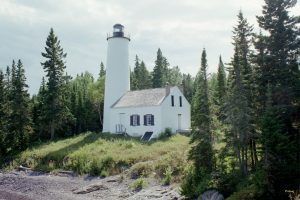
I’m ripped open by sunlight, cleaved by the water’s glittering knives. In a book in my backpack, lines from a Niedecker poem written decades ago:
and at the blue ice Superior
spot priest-robed Marquette
gazed azoic rock hornblende
granite basalt the common
dark in all the Earth
and his bones of such is coral
raised up out of his grave were
sunned and birch bark floated to
the straits.
Inside the lighthouse I read shipwrecks on the plaques and say the names of sailors lost. The names of explorers and lonely lighthouse wardens. How many others have come searching for answers and found only the question marks of rib and feather, the caesura of Superior’s dark water? Men set on entering the unknown or hell-bent on delivering lives back from the brink. Men that did nothing but record the movements, year after lonely year, of the raging waters. Do these men live on through their catalogues, or were they simply prisoners to the patterns of the wild, caged by the vocation they devoted themselves to? In the turret, looking out over the water, I wonder if they wrote poems or songs of their own, diaries or dirges against the passing days. I will find something here as they did, or not. Perhaps, contrary to what I once thought, there is no larger order to be discovered in the wilder world, nothing here to help us mark our lives with meaning.
***
Back at the docks, I wait for a ride back to my little cabin on the opposite side of the island. I think of the dark bedroom waiting there, the warped, slatted walls. I turn back for just a moment to press the fishery into the linocut of my body. The way you can’t recall a moment perfectly but can hold tight the particulars: net reels, buckets of coal sinkers, sour smell of linseed oil, lampreys pickled like fetal tissue in a test tube.
A powerboat—my ride—pulses like blood through the currents in the basin. A slick river otter pares the bones of a trout beside the pilings, lines his teeth with coins. Across the water a single eagle works the shallows. The nervous loons break in a frenzy. An afterimage of stacked skulls still pounds at my eyelids. On the island, questions of the living are stomped to fur and bone. My words drift away as on the wind. Maybe I have nothing good to say about my time here, and maybe I’ll leave as wounded and human as when I came. The island has not sped up my mourning or relieved me of the anxiety that my body, like all living bodies, is careening towards a grave. The island has not alleviated my fear of writing in a world that is falling apart. But it has unlocked something else, a sort of way forward, an invitation to unlace the desire for order and give over to the uncertainty that is manifest here among the lurking predators, here among the hiding prey.
There are mysteries that we, as writers, unlock and mysteries we simply ask about, dreams and questions and discords we raise for the sake of raising them alone. I’ve seen no wolves on this trip, and for that matter, no moose or fox either. But I’ve seen the bones to prove the hunger. I’ve seen the footprints and dropped antlers. Maybe wilderness, be it brutal death or stunning splendor, simply allows us to see ourselves in increasingly strange and marvelous ways, cast back in the eagle working his beat, and the chicks, still blurry with molt, trembling like bells in shadows. Wilderness experiences ask us, again and again, to unlace reason and order and bend with the world’s current.
A quiet falls around me on the shore. No more squawking chicks. No more churning motor. Tom’s boat kisses the dock and sends small ripples back at my feet. I think of Emerson: “Throw a stone into the stream and the ripples that propagate themselves are the most beautiful type of all influence.” And as the sun tips low and drips a red stain on the water, I toss a rock into the lapping waves and see the backscattering break again. I howl to the mother loon and the feasting eagle, to the last lurking wolves. I look to the water, the dark mirror that’s waiting below. Maybe it could be the ripples that sustain me, in this life, and not the virtue of the reflection.
Russell Brakefield is the author of Field Recordings (Wayne State University Press, 2018). He holds an MFA in poetry from the University of Michigan and teaches at the University of Denver. His recent work appears or is forthcoming in Nimrod, Hunger Mountain, and the Arkansas Review.
